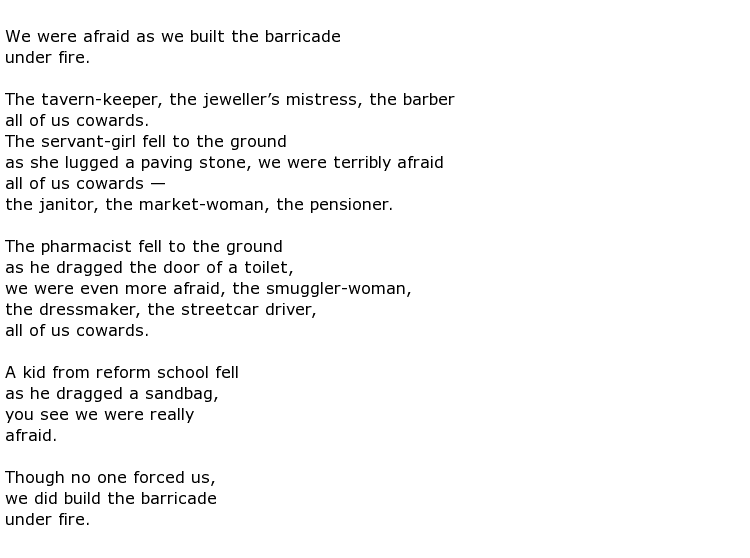 The surname of the 20th century Polish poet Anna Świrszczyńska is often abbreviated to Swir for western readers who might struggle with the pronunciation. Her large volume of written work deals with many diverse topics, such as the Polish struggles during the Second World War (a good example being Building the Barricade, detailing her experiences during the Warsaw uprising against the Nazis. She also writes about “feminine” matters such as motherhood, the sensuality of a woman and the female body.
The surname of the 20th century Polish poet Anna Świrszczyńska is often abbreviated to Swir for western readers who might struggle with the pronunciation. Her large volume of written work deals with many diverse topics, such as the Polish struggles during the Second World War (a good example being Building the Barricade, detailing her experiences during the Warsaw uprising against the Nazis. She also writes about “feminine” matters such as motherhood, the sensuality of a woman and the female body.
Anna Świrszczyńska was born some time in 1909 in the capital city of Warsaw, the daughter of an impoverished artist. She grew up in virtual poverty and had to interrupt her education in order to work. She supported herself as she grew older, managing to attend university where she studied medieval Polish literature. By the 1930s she was working for a teachers’ association and at this time got some of her poetry published.
Any career aspirations she may have had at that time though were, of course, cruelly interrupted in 1939 when the Nazis invaded Poland, thus precipitating World War II. Like many Poles she fought against this outrage and actually joined the resistance forces. During the uprising in her home city she worked as a military nurse.
The only safe place for her work to be published at this time was in a variety of underground publications. Such dissident behaviour was not allowed of course and she was arrested for her protests and resistance to the Nazis. She spent an agonising sixty minutes while her captors decided whether or not to summarily execute her. Fortunately something, or maybe somebody, dissuaded them and she lived to write again.
Naturally she was deeply influenced by her wartime experiences and, almost thirty years after the end of hostilities, she published a volume of short poems called Building the Barricade. It is a poignant, searingly honest view of life in the ghetto of Warsaw. Here is the title poem, a description of ordinary people fearing for their lives as they struggled to drag or carry everyday objects through the streets, only to be cut down by enemy fire before they can reach cover:

The collection simply tells the reader how ordinary people tried to stop the unstoppable – the Nazi tanks with their shells and flamethrowers, and soldiers intent on suppressing the population of a once great city with raking bullets from their machine guns. Other poets have told their heart-rending stories of war and occupation but this collection really drives home the terror and the horror of the situation.
Later in her life, in relatively peaceful though still uncertain times, she explored gentler, more personal themes such as the female body and sensuality although, even before the war, she had written some poetry of an erotic nature. She also wrote for children and directed a local children’s theatre right up to the time of her death in 1984.
Świrszczyńska won a number of literary awards during her lifetime, an example being the Krzyz Kawalerski Oderu Odrodzenia Polski which was awarded in 1957. English translations of her poetry collections include Happy as a Dog’s Tail, published in 1985 and when it was reviewed for the New York Times, Eva Hoffman wrote:

Anna Świrszczyńska lived in Krakow from 1945 until she died in 1984 having contracted cancer. She was 75 years old.

